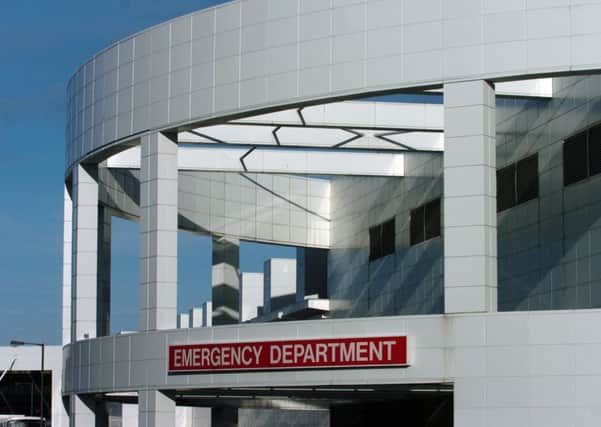Whistleblower claims stroke patients being denied vital care


The doctor, who wished to remain anonymous, contacted the Evening News to highlight a report from last year which showed at least 10 patients and as many as 36 had missed out on a clot-busting procedure’ known as thrombectomy.
The study published in the influential International Journal of Stroke, looked at the effects of NHS Lothian not having out of hours neuroradiologists to treat patients brought into the Royal Infirmary and Western General having had a stroke during “unsociable hours”.
Advertisement
Hide AdAdvertisement
Hide AdThis meant they were left more disabled than they would have been if they received the surgery, based on a sliding scale known as the modified Rankin Scale, which measures the degree of disability or dependence in the daily activities of people who have suffered a stroke.
The whistleblower said: “I find it woeful, unconscionable even, that an acute thrombectomy service is not provided in Edinburgh and the Lothians and the population of the region deserves better.
“The thrombectomy procedure is time-critical, so if patients don’t get it after they suffer their stroke and come to medical attention, then they miss out for good and this impacts on the residual level of long-term disability they are left with.
“This will change patients quality of life post-stroke and leave them more dependent, with the to be expected impacts on families, carers and health services.”
Scottish Labour’s Shadow health secretary last night accused the health board of “staying silent in a bid to avoid the truth” and described the situation as “appalling” claiming the patients must be informed immediately.
It is our understanding that none of the patients or their families have been made aware of the consequences of missing out on this treatment.
Since the study which covered the period from May 2016 to April 2017 the situation regarding thrombectomy services has got worse - with no health boards now offering the service due to a lack of funding.
This comes as NHS England has pledged £100 million to develop the stroke treatment which involves surgery using a thin tube to remove blood clots from the brain.
Advertisement
Hide AdAdvertisement
Hide AdAccording to the annual Scottish Stroke Improvement Programme this means at least 300 patients each year in Scotland are missing out on thrombectomy services that have the ability to dramatically reduce levels of disability for people experiencing the most severe type of stroke.
Paul Okroj, Director of Communications at Chest Heart and Stroke Scotland said: “The risk of stroke survivors being left more disabled is now much higher than this 2017 study shows.
“Where previously NHS Lothian had provided an ad-hoc thrombectomy service, the new Scottish Stroke Improvement Programme report has confirmed that now, no hospital in Scotland is able to offer thrombectomy, meaning as many as 300 people per year are more disabled and over 100 people are more dependent on others than if they had received the procedure.
“This lack of availability places Scotland far behind both England - where 25 hospitals deliver the treatment and £100m has been identified to develop this further - and the Republic of Ireland -where between 200 and 300 people receive a thrombectomy each year – in adopting the procedure.”
Strokes are the third biggest killer in Scotland with around 4,500 deaths each year which is “exceptionally high” compared to elsewhere in western Europe.
Tracey Gillies, Medical Director, NHS Lothian, said that in recent years the health board has provided stroke thrombectomy on an occasional basis.
She added: “The provision of interventional neuroradiology (INR) in Scotland is under unprecedented pressure with our three Consultant Interventional Neuroradiologists in Edinburgh supporting all emergency interventional neuroradiology work for Scotland in recent months.
“Without expanding this highly specialised workforce, which is recognised at national level as a priority, a decision has been made to stop any ad-hoc stroke thrombectomy in Edinburgh until further notice, with the exception of mechanical clot retrieval for basilar artery thrombosis.
“This decision took effect from 15 June.
Advertisement
Hide AdAdvertisement
Hide Ad“Work is underway in NHS Lothian and through a national group to review how a stroke thrombectomy service for Scotland could be provided. We hope this will move quickly.”
A Scottish Government spokesperson said: “We believe that thrombectomy can significantly improve outcomes and quality of life for people who have had an ischaemic stroke by avoiding or reducing the level of disability. That is why work is underway to develop a national planning framework for the provision of thrombectomy for Scotland.”
Despite research demonstrating people who have benefitted from thrombectomy have lower levels of disability and are better able to care for themselves than those who have not received it - no resources have been allocated to carry out the procedure within Scotland. A lack of funding has led to a shortage of trained staff and suitable facilities.